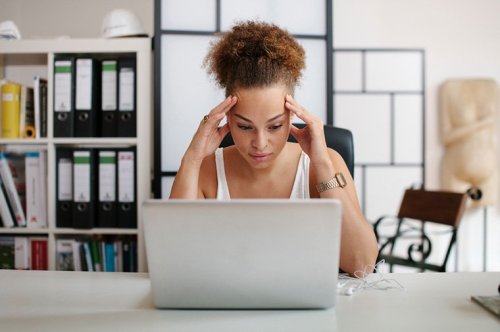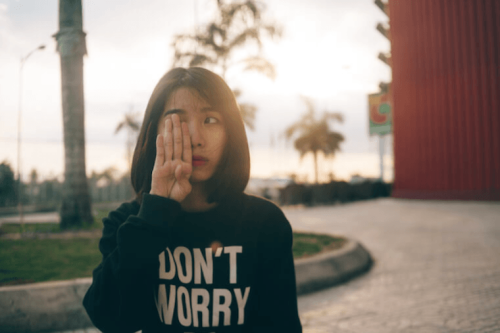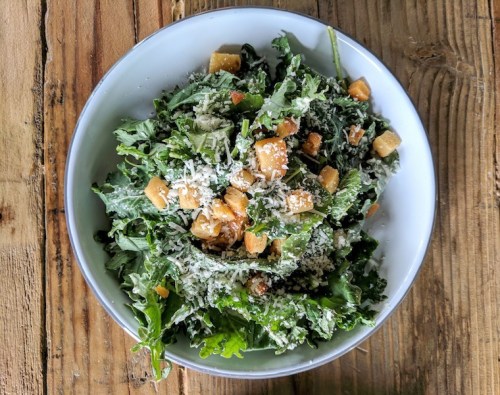Do you really need to be worried about all that screen time?
Two experts explain how screen time affects eyesight, how to know if you have a problem, and how you can keep your vision strong.

It feels great to be one of the first people to Instagram mermaid toast or your early-morning workout with your furry BFF. And when it’s Bachelorette time, does an episode even happen if you don’t live-tweet it?
All that time looking at screens (and the potentially eye-damaging blue light they emit) adds up, though—especially since you blink 66 percent less than normal while checking your iPhone or watching videos on your laptop, studies show.
Think about how much of your day is spent looking at illuminated digital data: To start off, there’s (at least) eight hours at the office using your work computer. Plus, the average American looks at their phone 76 times per day—for a total of 145 minutes. (A really good argument for ditching your phone on vacation, BTW.) And that doesn’t even figure in Netflix binges (hello, nightly hit of Friends, a la Emma Watson).
So how do you know how much is too much? Is it even such a big deal?
Here, two leading experts sound off on the SOS signals your eyes may be giving you—and how to keep your vision sharp.

How to know if you have a problem
Symptoms like blurred or double vision, fatigue, or recurring headaches are a tipoff. But the best way to assess things is to visit your optometrist—there’s no hiding that late-night Instagram scrolling habit from them. They can tell if screens are hurting your eyes, even if you don’t have any of the tell-tale signs, says Linda Chous, OD, optometrist and chief eye care officer of UnitedHealthcare.
There are muscles inside the eyes that have to work for us to see up close, and Dr. Chous says they have all a few tests to see how those muscles are working—which is a good reason to keep optometrists on your medical calendar (along with the gyno, dentist, and dermatologist). There’s no need to see your eye doctor as often as your main MD, but booking some face time every two years is ideal, Dr. Chous says.
“Just because you have 20/20 vision doesn’t mean you have healthy eyes. It can give you a false sense of security.”
“Just because you have 20/20 vision doesn’t mean you have healthy eyes,” she says. “It can give you a false sense of security.” Dr. Chous explains that the eyes truly are windows to the rest of the body, and often they can provide cues for things to look out for, like diabetes or high-blood pressure.
The takeaway: Make a regular date with your optometrist to avoid stressing out about your screen time year-round. Best-case scenario? You’re all good. Or maybe you just need your prescription tweaked. Worst-case? You come up with a plan together.

What you can do about it
Maybe you already know staring at a computer all day at work is messing with your vision—you can feel it. Or your eye doctor literally told you that you needed to chill with the screen time. (There isn’t a hard-and-fast rule when it comes to how many hours is “bad,” so let your doctor—and your eyes—be your guide.) So what do you do? James Stringham, PhD, who specializes in neurology and vision, says the first thing to do is fill up on more greens.
“Leafy greens are full of lutein and zeaxanthin, two specific types of antioxidants that are vital for vision,” he says. Dr. Stringham explains that they’re highly concentrated in eye tissue, which the blue light from screens can damage. “When that happens, people can start experiencing headaches or migraines,” he says.
“Leafy greens are full of lutein and zeaxanthin, two specific types of antioxidants that are vital for vision.”
Ideally, Dr. Stringham says people need 26 milligrams of the two antioxidants each day—about two cups of spinach. But most people don’t get that, and may opt to pop a supplement. (In fact, Dr. Stringham has been helping develop one, Blutein, which will be available next month at Vitamin Shoppe.) He says some professional athletes even take the two so-called “eye vitamins” to speed up how quickly their eyes react to a moving target. Some other foods with lutein and zeaxanthin: eggs, zucchini, broccoli, and Brussels sprouts.
What about those blue light-fighting glasses that are gaining traction? Dr. Stringham says if you’re getting enough bluetein and zeaxanthin, they aren’t necessary. “Wearing glasses doesn’t give you the other benefits filling up on the healthy foods would—lutein and zeaxanthin is in your brain too, so getting enough is important for cognitive function as well,” he says.
A breakdown in vision, he points out, is yet another sign of inflammation. So when you fill up on foods that fight that, it does your whole body good.
This inflammation-fighting food pyramid can help you build the ultimate healthy meal plan—and here are a few recipes, if you need guidance.
Sign Up for Our Daily Newsletter
Get all the latest in wellness, trends, food, fitness, beauty, and more delivered right to your inbox.
Got it, you've been added to our email list.










